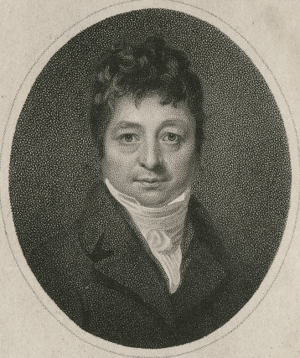Andrew Cherry facts for kids
Quick facts for kids
Andrew Cherry
|
|
|---|---|
 |
|
| Born | 11 January 1762 |
| Died | 12 February 1812 (aged 50) |
| Nationality | Irish |
| Occupation | actor; playwright |
Andrew Cherry (born January 11, 1762 – died February 12, 1812) was a talented Irish dramatist, songwriter, actor, and theatre manager. He was known for writing plays and performing on stage.
Contents
Andrew Cherry's Life Story
Early Life and First Steps in Theatre
Andrew Cherry was born in Limerick, Ireland, on January 11, 1762. His father, John Cherry, was a printer and bookseller. It was thought that Andrew might become a church minister.
However, at just eleven years old, Andrew left school in Limerick. He began working for James Potts, another printer and bookseller, in Dublin.
From a young age, Andrew loved the stage. When he was fourteen, he acted as an amateur in Dublin. He played Lucia in a play called Cato.
Three years later, he made his first professional appearance in Naas, County Kildare. He joined a traveling acting group led by a Mr. Martin. He played Feignwell in A Bold Stroke for a Wife.
Challenges and Success as an Actor
Being a traveling actor in Ireland was very hard. Andrew learned a lot about acting, but he often faced tough times. Stories from his life say that he once went three days without food.
Feeling discouraged, he went back to his old job as a printer in Dublin for three years. After trying to act again a few times, he joined a well-known company. This company was run by Richard William Knipe. Andrew later married Knipe's daughter in Belfast after her father passed away.
Andrew then joined a major acting company in Ireland led by Atkins. He became very well-known for playing leading roles in the north of Ireland.
In 1787, Andrew was asked to join the Theatre Royal, Smock Alley in Dublin. He took the place of Mr. Ryder, who had moved to Covent Garden. Andrew, often called 'Little Cherry,' was very popular in Dublin for five or six years. His first role at Smock Alley Theatre was Darby in The Poor Soldier.
Moving to English Theatres
In 1791, Andrew and his wife began performing in Hull, England. They joined Tate Wilkinson's company. Andrew took on funny roles that another actor, Fawcett, used to play.
He first appeared with Wilkinson's group in Wakefield. He played Vapid in The Dramatist. In 1794, Andrew left Wilkinson's company. He was upset because Fawcett, who was visiting, started playing his old roles again.
Andrew returned to Dublin for two seasons. After that, he and his wife joined Ward and Banks at the Theatre Royal in Manchester. Then, he moved to Bath, England, making his first appearance there on October 6, 1798.
From Bath, Andrew went to Drury Lane Theatre in London. He first appeared there on September 25, 1802. He played Sir Benjamin Dove in The Brothers and Lazarillo in Two Strings to your Bow. He stayed at Drury Lane until 1807. Later, he managed an acting company in Wales.
Andrew Cherry had a large family with his wife. He passed away in Monmouth, Wales, in February 1812.
How People Saw Andrew Cherry
People had different opinions about Andrew Cherry as an actor. Some, like Genest, didn't think he was very good.
However, Tate Wilkinson, another theatre manager, said Andrew had "great merit" in certain roles. Wilkinson also said that Andrew was skilled even in roles that weren't perfect for him. He believed that Andrew's acting skill was clear even when he was playing a character that didn't quite fit his usual style.
Another person, George Daniel, disagreed with negative comments about Cherry. He wrote that Cherry was "exceedingly clever" and made both the manager and the audience in Yorkshire very happy.
Andrew Cherry's Plays
Andrew Cherry wrote several plays, including:
- Harlequin on the Stocks, a pantomime (a play with music, dance, and no talking), produced in Hull in 1793.
- The Outcasts, an opera (a play where the words are sung), written in 1796 (but not printed).
- The Soldier's Daughter, a comedy (a funny play), acted at Drury Lane in 1804.
- All for Fame, a short funny sketch, performed at Drury Lane in 1805.
- The Village, or the World's Epitome, a comedy, acted at the Haymarket in 1805 (but never printed).
- The Travellers, an operatic drama (a play with singing and drama), performed at Drury Lane in 1806.
- Thalia’s Tears, a short tribute to an actor named King, performed at Drury Lane in 1806 (not printed).
- Spanish Dollars, a short musical play, performed at Covent Garden in 1805.
- Peter the Great, or the Wooden Walls, acted at Covent Garden in 1807.
- A Day in London, a comedy, acted at Drury Lane in 1807 (but not printed).
Some of these plays can be found in well-known collections of plays.
Sources
 This article incorporates text from a publication now in the public domain: Cousin, John William (1910). A Short Biographical Dictionary of English Literature. London: J. M. Dent & Sons. Wikisource
This article incorporates text from a publication now in the public domain: Cousin, John William (1910). A Short Biographical Dictionary of English Literature. London: J. M. Dent & Sons. Wikisource- Much of the material in this article previously appeared as 'Andrew Cherry, Actor and Dramatist' in The Era, 1 January 1881, p. 15, following the death of Miss Harriet Talbot Cherry, aged 83, Andrew Cherry's daughter.
 | Kyle Baker |
 | Joseph Yoakum |
 | Laura Wheeler Waring |
 | Henry Ossawa Tanner |

